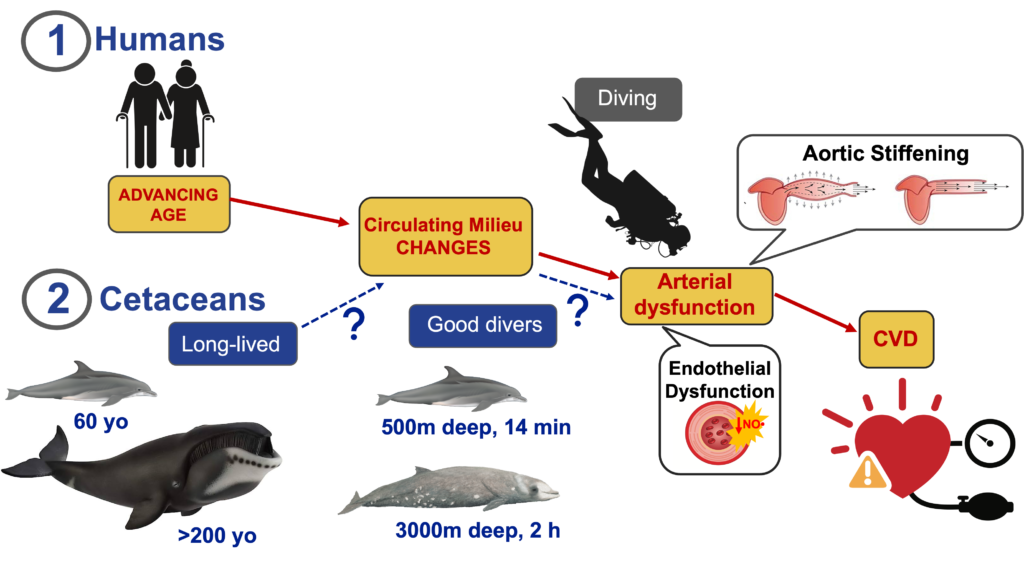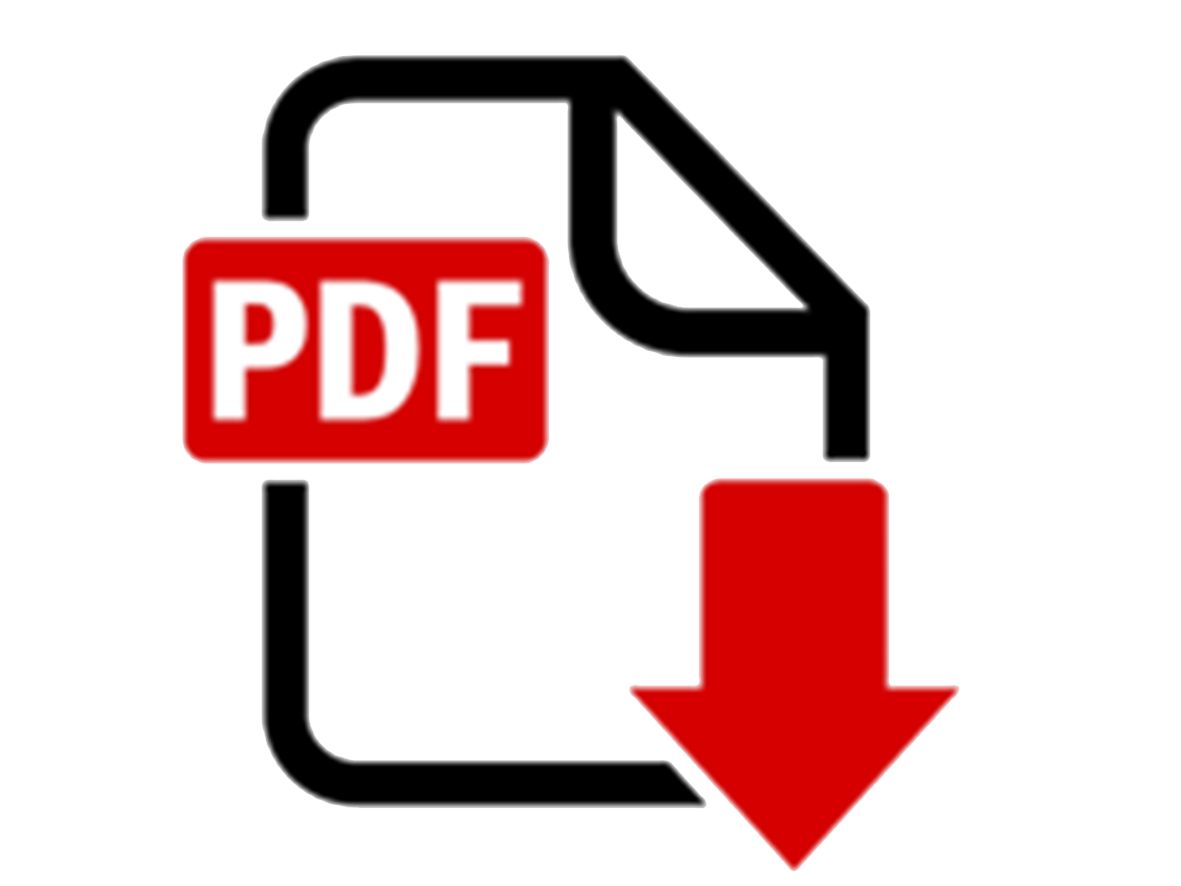
Age-related arterial dysfunction and gut dysbiosis in mice and cetaceans
Cardiovascular disease (CVD) is Europe’s number one cause of death. Aging is the primary risk factor for CVD, which is partly attributable to increased arterial dysfunction. Advancing age can induce adverse changes in the gut microbiome, which in turn, can activate systemic pro-oxidant and pro-inflammatory signaling pathways with detrimental downstream consequences in the arteries.

Figure 1: Schematic representation of the goal of the study
One main objective of this project is to investigate the role of the gut microbiome in modulating arterial function with aging. To approach this objective, we have leveraged mouse-to-mouse fecal transplant of gut microbiota to investigate if the gut microbiota alone transfers vascular phenotypes with aging. This experiment has shown that the gut microbiota modulates arterial function with aging, and we are studying the mechanisms involved. However, this important proof-of-concept step in determining the role of the gut microbiome in modulating age-related arterial dysfunction lacks the necessary translational insight to prove that the gut microbiome of humans is directly involved. Thus, we also investigated the causal effects of the human gut microbiome on artery function using a “humanized” mouse model, in which we transplanted human microbiota into gut microbiota-depleted mice. Together, these experiments demonstrate that unfavorable changes in the gut microbiome with aging contribute to arterial dysfunction. As such, we have established that the gut microbiota is promising new therapeutic target to prevent or reverse age-related arterial dysfunction (manuscript under review).

Figure 2: Schematic representation of the second goal of the study
Another goal of this project is to explore if cetaceans (i.e., whales and dolphins) may be a model for studying healthy arterial aging. Cetaceans are long-lived mammals and excellent divers. They undergo constant cycles of tissue hypoxia-reoxygenation and shear stress caused by vascular adjustments while diving. In humans, these adjustments produce oxidative stress, inflammation, and impairment of endothelial cells. Thus, a working hypothesis of this project is that cetaceans may have arterial-protective mechanisms to prevent dysfunction with age and diving. To approach this objective, first we have studied the effect of the circulating milieu (i.e., serum) in the arteries of an experimental validated model: mouse. Using a highly innovative research technique, we tested the hypothesis that, in contrast to humans, the serum of old dolphins does not impair arterial function in the arteries of young mice. This result supports the working hypothesis that, unlike in humans, aging in cetaceans does not induce adverse changes in the circulating blood that causes vascular dysfunction and disease. As such, the dolphin circulating milieu is a promising setting to identify factors that may protect artery function with aging. This work was presented at the American Physiology Summit 2024, and received a distinction award.
 The gut microbiome as a modulator of arterial function and age-related arterial dysfunction. A. G. Longtine, N. T. Greenberg, Y. B. d. Quirós and V. E. Brunt. American Journal of Physiology-Heart and Circulatory Physiology Vol. 0 Issue 0 Pages null. Accession Number: 38363212 DOI: 10.1152/ajpheart.00764.2023
The gut microbiome as a modulator of arterial function and age-related arterial dysfunction. A. G. Longtine, N. T. Greenberg, Y. B. d. Quirós and V. E. Brunt. American Journal of Physiology-Heart and Circulatory Physiology Vol. 0 Issue 0 Pages null. Accession Number: 38363212 DOI: 10.1152/ajpheart.00764.2023  Role of the circulating milieu in age-related arterial dysfunction: a novel ex vivo approach. S. A. Mahoney, N. S. VanDongen, N. T. Greenberg, R. Venkatasubramanian, M. J. Rossman, M. E. Widlansky, et al. American Journal of Physiology-Heart and Circulatory Physiology 2024 Vol. 326 Issue 5 Pages H1279-H1290. Accession Number: 38517225 DOI: 10.1152/ajpheart.00014.2024
Role of the circulating milieu in age-related arterial dysfunction: a novel ex vivo approach. S. A. Mahoney, N. S. VanDongen, N. T. Greenberg, R. Venkatasubramanian, M. J. Rossman, M. E. Widlansky, et al. American Journal of Physiology-Heart and Circulatory Physiology 2024 Vol. 326 Issue 5 Pages H1279-H1290. Accession Number: 38517225 DOI: 10.1152/ajpheart.00014.2024 The bottlenose dolphin (Tursiops truncatus): A novel model for studying healthy arterial aging. Y. Bernaldo de Quirós, S. A. Mahoney, N. S. VanDongen, N. T. Greenberg, R. Venkatasubramanian, P. Saavedra, et al. American Journal of Physiology-Heart and Circulatory Physiology Vol. 0 Issue 0 Pages null Accession Number: 39058431 DOI: 10.1152/ajpheart.00464.2024
The bottlenose dolphin (Tursiops truncatus): A novel model for studying healthy arterial aging. Y. Bernaldo de Quirós, S. A. Mahoney, N. S. VanDongen, N. T. Greenberg, R. Venkatasubramanian, P. Saavedra, et al. American Journal of Physiology-Heart and Circulatory Physiology Vol. 0 Issue 0 Pages null Accession Number: 39058431 DOI: 10.1152/ajpheart.00464.2024
- Changes in the Gut Microbiome with Healthy Aging Modulate Arterial Function in Humans and Mice. N. T. Greenberg, A. G. Longtine, A. Gonzalez, N. S. VanDongen, M. L. Burnsed-Torres, K. L. Lubieniecki, et al. American Journal of Physiology-Heart and Circulatory Physiology 2024 Vol. In review
This project is funded by the European Commission (H2020-MSCA-IF-2019): “Arterial Aging” ref#892267